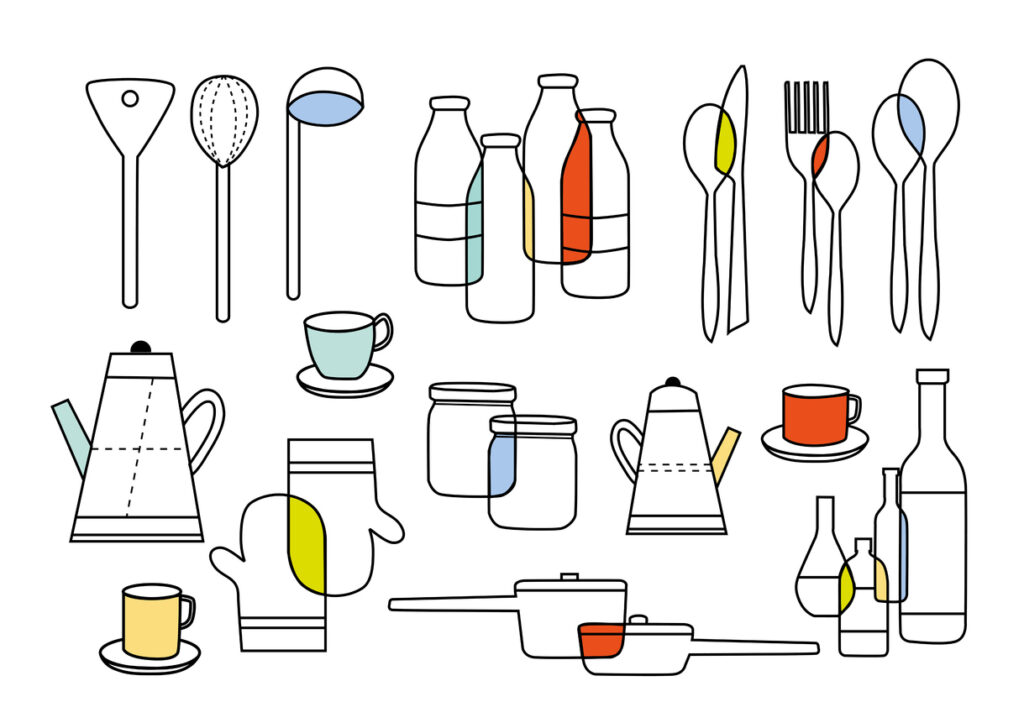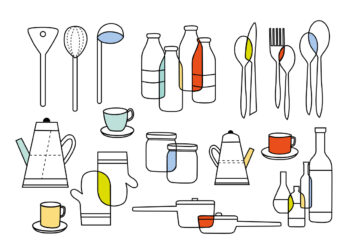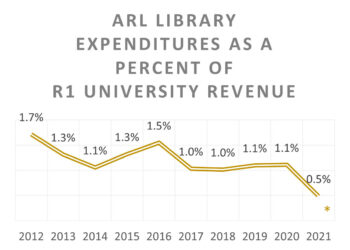In today’s Kitchen Essentials interview, we hear from Tasha Mellins-Cohen, Executive Director of COUNTER Metrics, a non-profit organization that provides a Code of Practice to enable publishers and vendors to report usage of their electronic resources in a consistent way. COUNTER is used — and supported by — a global community of library, publisher and vendor members.
Please tell us a bit about yourself — your role at COUNTER, how you got there, and why you embarked on a career in research infrastructure?
My first exposure to COUNTER was way back in 2005, when I was working for the Royal Society of Medicine Press and was asked to ‘figure out this counting thing’, which was around about the same time as I starting looking at other infrastructures like DOIs, and moving from SGML to XML for content markup. Coincidentally, it was also when I drafted my first open access policy allowing author archiving, so the roots of my dual roles as COUNTER’s Executive Director and Founder of Mellins-Cohen Consulting go deep!
It wasn’t until 2015 that I got properly involved with COUNTER, when I offered Lorraine Estelle (the then Project Director) the documents that became “The Friendly Guides to COUNTER, Release 4”. She invited me to join the Technical Advisory Group, then the Executive Committee, and I just never left. When Lorraine said she planned to retire, I had to throw my hat into the ring for consideration, and I joined as her replacement in March 2022.
In my role as Executive Director I have to do a bit of everything, from membership renewals admin to technical support, via education and comms. Luckily for me, I didn’t have a career path so much as a career meander through society and commercial publishing, technology providers, and a whole host of volunteer roles – one way or another, I’ve covered a lot of ground and picked up a lot of skills in different places.
Right now, I’m excited to be working on some big changes coming in the next couple of months. After publishing Release 5.1 of the Code of Practice last year (compliance in January 2025, please!), the Board and Executive Committee of COUNTER ran a project to review our strategy, and as a result of that we made some important decisions. First up we’re going to be using our legal name, COUNTER Metrics, rather than Project COUNTER, to reinforce that we’re not new and nor are we going anywhere. That’s accompanied by a new logo (shown below), and of course a new website at https://countermetrics.org that’s designed to be easier to navigate, more informative, and easier for us to update. We aim to have that live before our first ever COUNTER Conference, which is happening on May 16, and which will be followed by a whole raft of projects to boost our ability to support and educate our community.
What do you like most and least about working in research infrastructure?
One of my hobby-horses is the relationship between libraries and publishers, which can often become adversarial. We’re all working towards the same goal — dissemination of knowledge — and research infrastructure offers me the opportunity to build some bridges across that relationship gap. On a day-to-day basis, the biggest responsibility I have is to facilitate collaboration between groups from across the knowledge community, from tiny public libraries to the largest multinational publishers. It’s a real privilege!
On the more challenging side is funding. Recently Yvonne Campfens (OA Switchboard), Joanna Ball (DOAJ), and I have been working to boost the profile of what we’ve called small infrastructure and standards bodies. We are essential research infrastructure, but on a very small scale compared with groups like NISO or Crossref, and we spend a lot of our time trying to find funding. Our argument is that if we didn’t exist, the community would need to invent us, and it will cost everyone a lot less to properly support us now than it will to reinvent the wheel.
Based on your own experiences, what advice would you give someone starting, or thinking of starting, a career in research infrastructure?
The same thing I say to everyone, regardless of what career they’re looking at: take the opportunities in front of you. Whether that’s a job that looks interesting but not perfect, or a volunteer position, everything you do today can help to open new and different doors in future. To complement the idea of non-perfect jobs, try to figure out what you are good at and you’ll learn to love it (even if it seems tedious to the outside world).
What sort of infrastructure does COUNTER provide, and who are your users?
The COUNTER Code of Practice is the open standard which defines what, how, and when to count usage of online content, and is the primary focus of our work. We try to keep major updates as infrequent as possible — typically every fifth year — though we do add small fixes and backward-compatible new features in the interim. We put out Release 5.1 of the Code last year, which publishers need to be compliant with by January 2025. Our focus was on optimizing the previous Release 5 for open access and bibliodiversity so, while R5.1 is considered a major update, it’s really not as big as the jump from Release 4 to R5 was!
Several hundred publisher platforms are listed in our Registry as offering COUNTER-compliant usage reports. We don’t track libraries in the same way, but the last time we asked, libraries in more than 150 countries around the world said they were using COUNTER reports for their usage analytics. Incidentally, one of the questions I get asked most regularly by libraries is why more publishers aren’t offering COUNTER reports, so, if your employer isn’t on the Registry, please get in touch and I’ll be delighted to help you!
We know the Code itself is complex, so we have produced a suite of educational materials to complement it and introduce the standard to new people, whether they’re publishers or librarians. There are also a lot of tools to help tackle different challenges, whether that’s the Validation Tool (which checks to see whether usage reports are structurally correct) or the Harvester Tools (which help automate report harvesting). They’re all available through our website, projectcounter.org.
How is COUNTER sustained financially?
We’re reliant on members for support — those publishers and libraries who recognize the value in having a shared standard for usage metrics, and contribute to keep us going. We also have a very tiny number of generous sponsors who help us realize specific projects, for example, the groups who helped fund translations of the new Friendly Guides to COUNTER last year.
As one of the leaders of a research infrastructure organization, what do you think are the biggest opportunities we’ve not yet realized as a community — and what’s stopping us?
We seem to have a bad habit of thinking in silos and for the short-term, which means we’re unable to fully realize the benefits of the infrastructure we have.
As an example of short-termism, the old Distributed Usage Logging project (I know, I know, we should have called it Syndicated Usage Metrics because SUM is a better name than DUL). This was intended as a way to share item-level usage across platforms so that publishers could see the value of syndicated usage. It was technically a heavy lift so didn’t get as much traction as it deserved, and as a result it is no longer fully supported — and now we’re having to reinvent the wheel as syndication takes an ever-larger role in the knowledge ecosystem. I’ve had some early conversations with STM about reviving the project, so watch this space!
On the silo front, I can point to (but will not name!) some open access resources and projects that are calling for a standard for measuring and reporting usage, only to be shocked to find that COUNTER’s been doing just that since 2017. If they work with us, we’ll truly be able to validate the claims that OA drives usage by comparing COUNTER metrics for subscription content with COUNTER metrics for open content — apples to apples, rather than apples to beachballs.
Looking at your own organization, what are you most proud of — and what keeps you awake at night?
Resources — and resources! Despite being an industry standard that is relied on by thousands of libraries and hundreds of publishers around the world, COUNTER runs on less than one full-time equivalent staff member, just two and a half days per week of me and one day from Siân Harris, supported by some truly dedicated volunteers. For example, the COUNTER Validation Tool was built and is maintained by one person in their spare time. It’s a testament to my predecessors (Lorraine and, before that, Peter Shepherd), and to our incredible team of volunteers, that we’ve been around for so long and achieved so much – but I do occasionally wake up at 3am in a cold sweat, thinking about risk mitigation strategies. If there’s a generous funder or sponsor out there who can help us host and maintain the Validation Tool, for example, I’d really like to hear from them!
What impact has/does/will AI have on COUNTER’s work?
I’ve had quite a few conversations in the last 15 months about how to count usage of content associated with or generated by AI tools, but we can’t and won’t update the Code of Practice until we know what we need to address, so it’s very much ‘watch this space’.
What changes do you think we’ll see in terms of the overall research infrastructure over the next five to ten years, and how will they impact the kinds of roles you’ll be hiring for at COUNTER?
We’re hiring at COUNTER? Joking aside, being a volunteer myself I’m adamant about respecting volunteer time, so if we can find a way to bring in additional funds my absolute top priority is technical resource. I’m able to answer most of the technical questions without relying on our volunteers, but when it comes to the more complicated stuff like the details of the COUNTER API (formerly known as SUSHI) or parsing some of the errors from the Validation Tool, I’m butting up against the limits of my knowledge.
Financial pressures will inevitably continue, and I suspect we’ll see more cycles of tech hype, which may or may not result in actionable and practical solutions to some of our problems. I would love to see infrastructure bodies collaborating more so that we can collectively be more than the sum of our parts. For example, I’d love to find a way to sustainably and securely deliver item-level usage metrics to places like the OA Switchboard or ORCID, so that institutions, funders, and authors can see the usage impact of individual articles or book chapters.
Discussion
5 Thoughts on "Kitchen Essentials: An Interview with Tasha Mellins-Cohen of COUNTER"
Hi, as an electronic resources librarian I cannot stress enough how incredibly important the work of COUNTER Metrics (formerly Project COUNTER) is to academic libraries. Many of us are basing huge, even multi-million-dollar annual decisions on the data that vendors provide in compliance with this standard. Decisions to break up journal package “Big Deals” often start with a COUNTER data analysis, for instance.
A vendor who is NOT compliant with COUNTER may find itself in danger of losing customers due to a lack of reliable data to justify the expense of their products.
Disclaimer: I serve on a volunteer COUNTER committee to make sure the needs of smaller academic libraries like mine are represented in the discussions. I also provide a free software tool for librarians to harvest and work with this data.
Hi. Interesting interview. Working on the publisher side COUNTER is immensely important to the work I do. It would be a rare day that I’m not manipulating COUNTER data in a report. The great thing about COUNTER being a standard is that it is interoperable in systems and can be harvested via protocols such as SUSHI. I’m working with academic libraries as the continue to implement and support Read and Publish agreements across their organisation. One of the most common pain points we encounter is around publishing data and the lack of interoperability, or indeed a standard, for this type of information. Is there scope for publishing data to be included in future versions of COUNTER?
The Code already includes mechanisms for publishers to extend their reports if they want to do so, including things like publishing data, so that’s one option. There won’t be another big update for quite some time, but I’d love to talk to you about specific fields you’d like to see, or business cases to address, as there’s probably scope to tackle those outside the Code in the interim. Please drop me a line at tasha@countermetrics.org!
It’s really lovely to see the COUNTER branding evolve so well! It’s a great new look, reflecting the innovative work COUNTER is doing.
SUM not DUL – much better! Remind me to ask you next time I am trying to name something Tasha!



